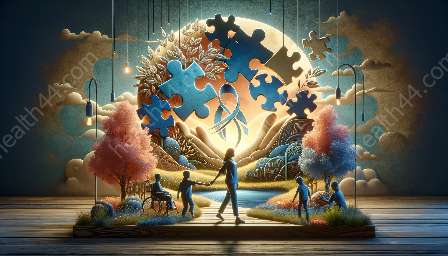Autism Spectrum Disorder (ASD) is a complex neurodevelopmental condition that presents with a wide range of symptoms and severity levels. Understanding the different types of ASD is crucial for providing appropriate support and intervention for individuals with this condition. In this comprehensive guide, we will explore the various types of autism spectrum disorder, their characteristics, and how they are related to other health conditions.
1. Autistic Disorder (Classic Autism)
Classic autism, also known as autistic disorder, is one of the most well-known types of ASD. Individuals with this type of ASD typically exhibit significant challenges in social interaction, communication, and behavior. They may also display repetitive behaviors and have limited or narrow interests. Additionally, they may struggle with sensory sensitivities, making everyday experiences overwhelming.
2. Asperger's Syndrome
Asperger's syndrome is a form of autism spectrum disorder characterized by milder symptoms compared to classic autism. Individuals with Asperger's syndrome often have average or above-average intelligence and may display intense interests in specific subjects. They may struggle with social interactions and communication, often experiencing difficulty understanding social cues and nonverbal communication.
3. Pervasive Developmental Disorder-Not Otherwise Specified (PDD-NOS)
Pervasive Developmental Disorder-Not Otherwise Specified (PDD-NOS) is a term used to describe individuals who do not fully meet the criteria for other types of ASD but still exhibit significant challenges in social interactions and communication. They may have milder symptoms or present with a combination of symptoms from different types of ASD.
4. Childhood Disintegrative Disorder
Childhood Disintegrative Disorder is a rare type of autism spectrum disorder characterized by a significant loss of previously acquired skills, such as language, social, and motor skills. This regression typically occurs between the ages of 2 to 10 years and can lead to profound impairment in multiple areas of functioning.
5. Rett Syndrome
Rett syndrome is a genetic neurological disorder that primarily affects girls and is often considered a separate condition from other types of ASD. Individuals with Rett syndrome experience a period of typical development followed by regression, resulting in severe impairments in language and motor skills. They may also exhibit repetitive hand movements, breathing problems, and seizures.
Relationship Between ASD and Other Health Conditions
Individuals with autism spectrum disorder may also experience co-occurring health conditions that can impact their overall well-being. Some common health conditions that are associated with ASD include:
- Attention Deficit Hyperactivity Disorder (ADHD)
- Intellectual Disability
- Epilepsy
- Anxiety Disorders
- Gastrointestinal Issues
- Sleep Disorders
It’s important for healthcare professionals and caregivers to be aware of these co-occurring conditions to provide comprehensive care and support for individuals with ASD.


